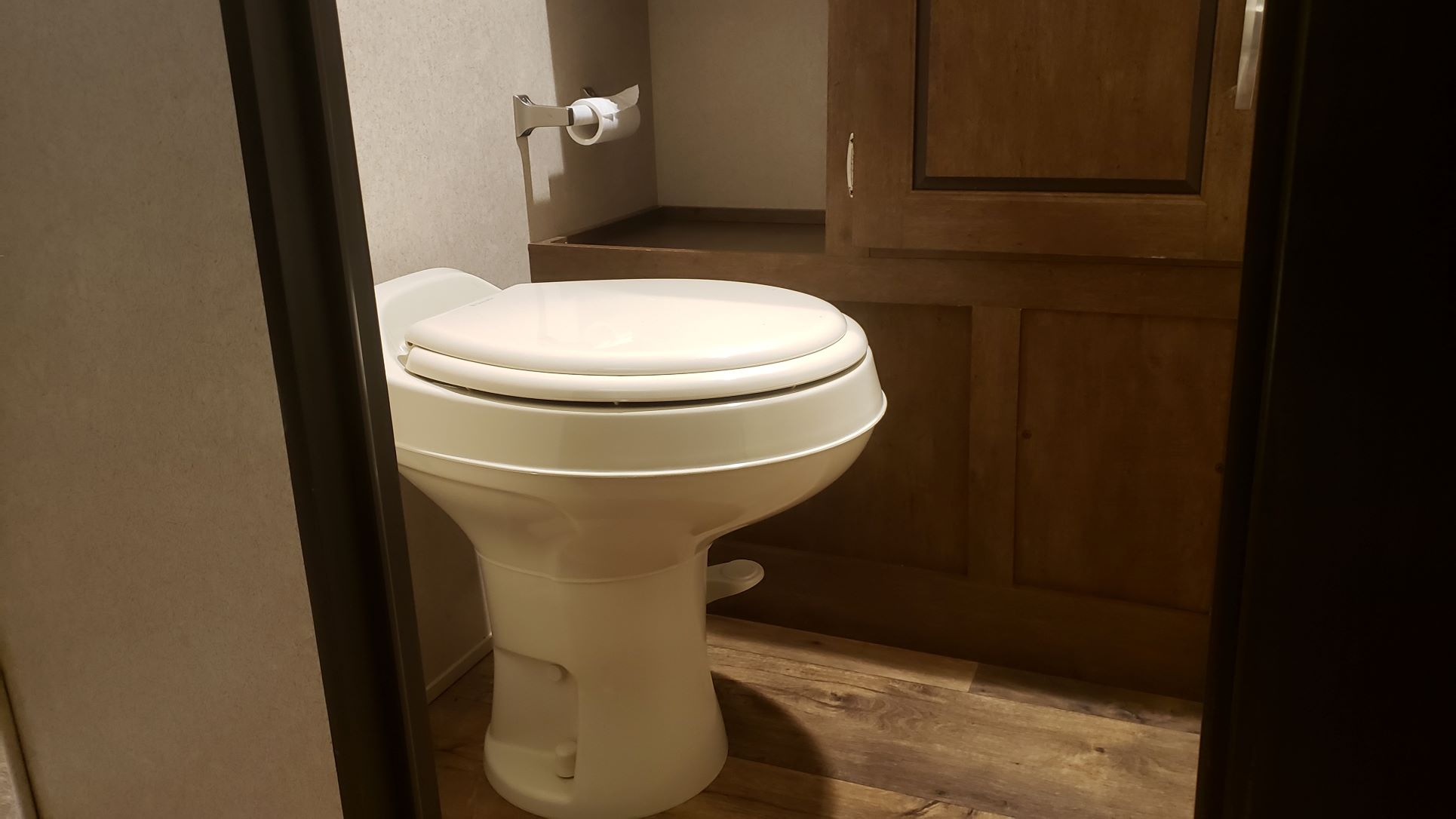Bathroom facilities onboard RVs have improved significantly over the last 20 years – particularly when it comes to composting toilets.
So much more efficient, effective, and easy to use than they ever used to be, today’s composting toilets are quickly becoming the “go-to” bathroom option on board. This isn’t to suggest that composting toilets are without their drawbacks or downsides.
In the rest of this detailed guide, we run through (almost) everything you need to know about these kinds of toilets – the good and the bad – to better decide whether or not they are the right option for you.
RV Composting Toilet 101
Before we get into the meat and potatoes of the pros and cons of RV composting toilets, it’s important to first break down exactly what these toilets are, what they do, and why they are so popular.
For starters, a composting toilet looks like a traditional toilet – but it doesn’t use any water.
Instead, these toilets are designed to leverage a composting technology that separates liquid waste from solid, breaks them down into separate containers, and processes all of your waste using 100% natural and often organic compounds.
The end result is a toilet that is near silent in operation, doesn’t require you to tap into valuable (and limited) water resources on board, and is pretty simple to clean and maintain.
To empty a composting toilet, all you have to do is pull out the separate “containers” and empty them in designated areas – or use the compost the way you would use traditional compost (in a garden, on your lawn, etc.).
That’s tough to beat!
RV Composting Toilet Pros and Cons
Now that we’ve gone over what a composting toilet is (and a big part of why they are so popular) let’s get into the pros and cons of these systems.
Pros
No Plumbing Needed
As we highlighted just a moment ago, composting toilets will not require any plumbing whatsoever.
These are legitimate “set it and forget it” kinds of toilets that can install into much more compact spaces in your RV.
Every RV owner can tell you that space is always at a premium. Getting a few extra feet to dedicate to some other system (or even expand the living space) can make an RV a lot more comfortable.
Because there are no pipes and no plumbing, you don’t have to worry about hooking up to a dump station regularly and flushing all of your waste every week (or even more often than that).
Very Environmentally Friendly
Secondly, composting toilets are much more environmentally friendly than traditional toilets for several different reasons.
First, composting toilets will take a ton less water than a traditional toilet would.
That’s a huge upgrade in and of itself.
Secondly, though, the composted waste can be recycled in a bunch of different ways – including as a fertilizer. The compounds used for composting the waste are 100% natural and often 100% organic.
Best of all, in many states, you can actually dump composted waste in the regular garbage. You won’t have to spend a lot of money on specialty dumping fees.
No Stink
One of the things that most people in the world of composting toilets are shocked by is the fact that they have almost no smell whatsoever.
As soon as people start to hear about composted waste, no water being used in a toilet system, and separated containers of waste sitting around for days, if not weeks or even months, they think the system will stink to high heaven.
Nothing could be further from the truth, though.
Thanks to the use of the composting compounds, unpleasant aromas are never going to be an issue. Your composting toilet may smell even nicer than a traditional setup!
Can’t Be Clogged
Because there are no pipes to clog, you won’t ever have to worry about your RV bathroom getting backed up. You won’t ever have to worry about emergency plumbing projects. And you won’t have to worry about your only bathroom on the go-getting shutdown.
Cons
A Little Expensive
Of course, because composting technology is still relatively new and always in demand, you can expect to spend a little bit more money on your composting toilet than on a traditional setup.
The convenience, hygienic benefits, and overall utility of a composting toilet generally make these upfront costs well worth it over the long haul.
Takes Some Getting Used to Using
Truth be told, using a composting toilet can take a little bit of time to get used to.
Not only are you going to have to get used to using the actual toilet self, but you’re going to have to get used to the process of holding waste, composting waste, and getting rid of waste in a brand-new way as well.
The adjustment period shouldn’t take too long (maybe a couple of weeks at the most), but there will be an adjustment period all the same.
Needs a Reliable Power Source
Lastly, your composting toilet will require a small amount of electricity on a regular and consistent basis to operate the ventilation system.
Without that electrically controlled ventilation system, the composting process cannot be as effective or as efficient as it should be. This can lead to unsafe and unsanitary conditions happening in a hurry, so you need to be sure that you can provide “always on-demand” power to this system.
Closing Thoughts
When you get right down to it, the benefits of using an RV composting toilet significantly outweigh the drawbacks and downsides.
There’s a reason why these toilets are the most in-demand options today and why so many companies continue to innovate and improve the technology consistently.
Don’t be surprised if RVs of the future ship with composting toilets as a standard feature in the idea of using a traditional toilet becomes almost unheard of.
It’ll happen sooner than later, thanks to the benefits of these toilets.
Don’t forget to check out our Recommended RV Equipment list!
Get a FREE copy of the Go Together Go Far Travel Trailer Hookup and Disconnect Checklist when you sign up for the Go Together Go Far Newsletter!
Want to learn more about different types of RVs? Check out:
- Best Off-Road Camper Trailer Under $10,000
- Best Bunkhouse Travel Trailer Under 30 Feet
- Are Lance Travel Trailers Any Good?
- Do Rope Lights Deter Rodents?
- What Are the Best Names in the RV Industry?
- 3 Best Travel Trailers for Family of Four
- Blue Ox SwayPro Basics: Top Questions Answered
- Adding A Washer Dryer To Travel Trailer? What You Need To Know.
- Best Drone For Camping, Backpacking, and RVing: A Complete Guide to Drones for RVers
- Furniture and RVs – How To Get It Through the Door…
- How To Get Rid Of A Poop Pyramid In RV Black Tank
- Do You Know How Long To Keep Fresh Water In RV Tank Storage?
- What Is The Best Outdoor Security Camera System For Your RV?
- RV Bumper Mount Grills: 5 Best Options For Your RV Or Camper
- Best Electric Tankless Water Heater for Your RV. What You Need To Know
- Read Before You Buy! How to Find the Best Scooter for RV Camping
- 3 Best Travel Trailers for Family of Four
- Top RV Brands: What Are the Best Names in the RV Industry?
- Lance Campers: What Makes Them So Different?
- Best Bunkhouse Travel Trailer Under 30 Feet
- Best Off-Road Camper Trailer Under $10,000
- Best Weight Distribution Hitch With Sway Control For Travel Trailers in 2022
- What Are The Best Built Travel Trailers? Things To Consider.
- How Does An RV Refrigerator Work? A Quick Guide.
- Why Does My RV Carbon Monoxide Detector Keep Beeping? A Quick Guide.
- Where Is The Power Converter In My RV Or Travel Trailer
- What is the Best Generator for 50 Amp RV?
- Wireless RV Security Camera Systems: Is Solar Powered Security Without Wi-Fi An Option?
- Best Portable Air Conditioner for Camping for 2022
- How to Find the Best 3500 Watt Inverter Generator for RV Camping
- Best Propane Generator For Your RV: Read This Before You Buy!


